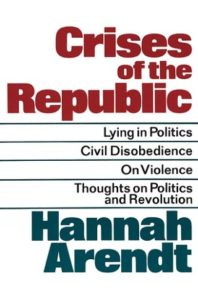Lying in politics.
January 15, 2017‘Nowhere is this liar’s loss of perspective more damaging to public life, human possibility, and our collective progress than in politics, where complex social, cultural, economic, and psychological forces conspire to make the assault on truth traumatic on a towering scale.’
Arendt considers one particularly pernicious breed of liars — “public-relations managers in government who learned their trade from the inventiveness of Madison Avenue.”
[Note: e.g. the Pentagon budgets $5 B for PR]
In a sentiment arguably itself defeated by reality — a reality in which someone like Donald Trump sells enough of the public on enough falsehoods to get gobsmackingly close to the presidency — she writes:
The only limitation to what the public-relations man does comes when he discovers that the same people who perhaps can be “manipulated” to buy a certain kind of soap cannot be manipulated — though, of course, they can be forced by terror — to “buy” opinions and political views. Therefore the psychological premise of human manipulability has become one of the chief wares that are sold on the market of common and learned opinion.
In what is possibly the finest parenthetical paragraph ever written, and one of particularly cautionary splendor today, Arendt adds:
(Oddly enough, the only person likely to be an ideal victim of complete manipulation is the President of the United States. Because of the immensity of his job, he must surround himself with advisers … who “exercise their power chiefly by filtering the information that reaches the President and by interpreting the outside world for him.” The President, one is tempted to argue, allegedly the most powerful man of the most powerful country, is the only person in this country whose range of choices can be predetermined. This, of course, can happen only if the executive branch has cut itself off from contact with the legislative powers of Congress; it is the logical outcome in our system of government when the Senate is being deprived of, or is reluctant to exercise, its powers to participate and advise in the conduct of foreign affairs. One of the Senate’s functions, as we now know, is to shield the decision-making process against the transient moods and trends of society at large — in this case, the antics of our consumer society and the public-relations managers who cater to it.)
Arendt turns to the role of falsehood, be it deliberate or docile, in the craftsmanship of what we call history:
Unlike the natural scientist, who deals with matters that, whatever their origin, are not man-made or man-enacted, and that therefore can be observed, understood, and eventually even changed only through the most meticulous loyalty to factual, given reality, the historian, as well as the politician, deals with human affairs that owe their existence to man’s capacity for action, and that means to man’s relative freedom from things as they are. Men who act, to the extent that they feel themselves to be the masters of their own futures, will forever be tempted to make themselves masters of the past, too. Insofar as they have the appetite for action and are also in love with theories, they will hardly have the natural scientist’s patience to wait until theories and hypothetical explanations are verified or denied by facts. Instead, they will be tempted to fit their reality — which, after all, was man-made to begin with and thus could have been otherwise — into their theory, thereby mentally getting rid of its disconcerting contingency.
This squeezing of reality into theory, Arendt admonishes, is also a centerpiece of the political system, where the inherent complexity of reality is flattened into artificial oversimplification:
Much of the modern arsenal of political theory — the game theories and systems analyses, the scenarios written for imagined “audiences,” and the careful enumeration of, usually, three “options” — A, B, C — whereby A and C represent the opposite extremes and B the “logical” middle-of-the-road “solution” of the problem — has its source in this deep-seated aversion. The fallacy of such thinking begins with forcing the choices into mutually exclusive dilemmas; reality never presents us with anything so neat as premises for logical conclusions. The kind of thinking that presents both A and C as undesirable, therefore settles on B, hardly serves any other purpose than to divert the mind and blunt the judgment for the multitude of real possibilities.
But even more worrisome, Arendt cautions, is the way in which such flattening of reality blunts the judgment of government itself — nowhere more aggressively than in the overclassification of documents, which makes information available only to a handful of people in power and, paradoxically, not available to the representatives who most need that information in order to make decisions in the interest of the public who elected them. Arendt writes:
Not only are the people and their elected representatives denied access to what they must know to form an opinion and make decisions, but also the actors themselves, who receive top clearance to learn all the relevant facts, remain blissfully unaware of them. And this is so not because some invisible hand deliberately leads them astray, but because they work under circumstances, and with habits of mind, that allow them neither time nor inclination to go hunting for pertinent facts in mountains of documents, 99½ per cent of which should not be classified and most of which are irrelevant for all practical purposes.
[…]
If the mysteries of government have so befogged the minds of the actors themselves that they no longer know or remember the truth behind their concealments and their lies, the whole operation of deception, no matter how well organized its “marathon information campaigns,” in Dean Rusk’s words, and how sophisticated its Madison Avenue gimmickry, will run aground or become counterproductive, that is, confuse people without convincing them. For the trouble with lying and deceiving is that their efficiency depends entirely upon a clear notion of the truth that the liar and deceiver wishes to hide. In this sense, truth, even if it does not prevail in public, possesses an ineradicable primacy over all falsehoods.
She extrapolates the broader human vulnerability to falsehood:
The deceivers started with self-deception.
[…]
The self-deceived deceiver loses all contact with not only his audience, but also the real world, which still will catch up with him, because he can remove his mind from it but not his body.
-Maria Papova/brainpickings
The New Yorker
RICHARD RORTY’S PHILOSOPHICAL ARGUMENT FOR NATIONAL PRIDE
[Stephen Metcalf]
“In the days leading up to and following the Presidential election, a seemingly prophetic passage from the late philosopher Richard Rorty circulated virally on the Internet. The quote, which was subsequently written about in the Timesand the Guardian and on Yahoo and the Web site for Cosmopolitan magazine, is from his book “Achieving Our Country,” published in 1998. It is worth quoting at length:
Members of labor unions, and unorganized and unskilled workers, will sooner or later realize that their government is not even trying to prevent wages from sinking or to prevent jobs from being exported. Around the same time, they will realize that suburban white-collar workers—themselves desperately afraid of being downsized—are not going to let themselves be taxed to provide social benefits for anyone else.
At that point, something will crack. The nonsuburban electorate will decide that the system has failed and start looking around for a strongman to vote for—someone willing to assure them that, once he is elected, the smug bureaucrats, tricky lawyers, overpaid bond salesmen, and postmodernist professors will no longer be calling the shots. . . . Once the strongman takes office, no one can predict what will happen.
The chilling precision of these words resulted in renewed interest in Rorty, who died in 2007. Eighteen years after its release, “Achieving Our Country” sold out on Amazon, briefly cracking the site’s list of its hundred top-selling books. Harvard University Press decided to reprint it.
Rorty’s new fans may be surprised, opening their delivery, to discover a book that has almost nothing to do with the rise of a demagogic right and its cynical exploitation of the working class. It is, instead, a book about the left’s tragic loss of national pride. “National pride is to countries what self-respect is to individuals, a necessary condition for self-improvement,” Rorty writes in the book’s opening sentence, before describing in grim detail how the democratic optimism, however qualified, of Walt Whitman, John Dewey, and James Baldwin has been abandoned in favor of what he calls a “blasé” and “spectatorial” left.
Newcomers to Rorty and “Achieving Our Country” may be surprised on a second count as well. The Times piece about the new interest in the book summarized its argument like so: “In universities, cultural and identity politics replaced the politics of change and economic justice.” This is broadly accurate, but incomplete. Rorty, in “Achieving Our Country,” shows unqualified admiration for the expansion of academic syllabi to include nonwhite and non-male authors, and describes such efforts as one means of awakening students to the “humiliation which previous generations of Americans have inflicted on their fellow citizens.” He adds, without reservation, “Encouraging students to be what mocking neoconservatives call ‘politically correct’ has made our country a far better place.”
Rorty’s only issue with identity politics was that the left, having worked so hard to transfer stigmatic cruelty away from received categories like race and gender, had done too little to prevent that stigma from landing on class—and that the white working class, finding itself abandoned by both the free-market right and the identity left, would be all too eager to transfer that stigma back to minorities, immigrants, gays, and coastal élites. (Hence the viral prophecy.)
The principal object of Rorty’s derision was neither identity politics nor the rise of an ignoble free-market right but a peculiar form of decadence, which his larger intellectual project aimed to counter. I knew Rorty a little; he was a shy and gentle man, a red-diaper baby who grew up to be a bird-watcher and a savorer of Proust and Kant in their original languages. But his loathing of the academic left was neither shy nor gentle. The “Foucauldian” left, he writes in “Achieving Our Country,” “represents an unfortunate regression to the Marxist obsession with scientific rigor.” In the specific case of Foucault, this involved locating the “ubiquitous specter” known as “power” everywhere, and conceding that we are without agency in its presence. “To step into the intellectual world which some of these leftists inhabit is to move out of a world in which citizens of a democracy can join forces to resist sadism and selfishness into a Gothic world in which democratic politics has become a farce,” he writes.
How could Rorty have celebrated the rise of identity politics in the university while also deriding the major trends in critical theory as illiberal and decadent? And how did his exhortation for a renewed national pride connect with his earlier, more technical work on human mentality and the foundations of knowledge? Early in his career, Rorty had been preoccupied by the major questions of modern philosophy as they first arose in the seventeenth century, alongside the rise of experimental science. Is the human mind an object in the world, like all the other objects in the world? Is it, too, universally law-obedient to physics? And, if it is law-obedient, do we lack agency and, like other objects, inherent dignity?
Instead of solving these problems, Rorty thought we could ditch them, just as Descartes had ditched the problems of thirteenth-century scholasticism, and at a similarly low cost to the progress of human knowledge. The cheerfully non-philosophical way to ditch them was to ignore them, like most healthy people do. The slightly more philosophical method was to notice that people argued from, rather than to, their moral intuitions—an observation that may encourage us to accept that truth is at best a matter of consensus, not an observable fact of the world. The most philosophical way to abandon them was therapeutically: one could relive the philosophical past the same way an analysand relives her emotional past. By drawing, inch by agonizing inch, an unconscious pattern to the surface, one might discard it forever.
Around the same time Rorty completed his metaphysical therapy, and was reinventing himself as a general-interest writer, his peers in the English department were replacing the categories of mind and world with language and text. They were, in other words, reproducing the epistemological conundrums that had bedeviled modern philosophy since Descartes. Instead of ditching the old neurotic patterns, literary theory repeated them ad nauseum. Problems of knowledge became problems of interpretation. The glamour of its European intellectualism aside, this meant only that literary theory knocked back and forth between the assertion that nothing can be known—versions of this skepticism are found in Descartes, Hume, Berkeley, and Kant—and the assertion that skepticism can be vanquished when knowledge is reconstructed upon a new foundation.
Foucault rode this line perfectly. He said that all knowledge was inherently unstable, because it was historically contingent, and he built a new way of knowing around the master term “power.” The primal Foucauldian move is to locate abstract and universal rights, reason, and the notion of the human within concrete social practices, and show how they were coercive or hypocritical—or sadistic—from the start. The perfect symbol for liberal modernity is a prison, as governed by a panopticon, an instrument of universal surveillance. Point taken; but Rorty believed that, in addressing more or less all of humanity as his fellow-prisoners, Foucault was being decadent, and not simply because he was weakening the distinction between metaphorical and actual inmates. Foucault made seeing, or, really, seeing through, into a revolutionary activity, while implying that only an apocalyptic transformation in human thought might liberate us.
Foucault was a great philosopher. He worked tirelessly on behalf of prison reform for actual prisoners, and he was as canny as anyone about his own epistemological biases. Rorty and Foucault were, however, as temperamentally antithetical as two human beings can be. From intellectual habits that Rorty distrusted, Foucault moved on to a belief that Rorty detested. After exposing liberalism as a lie, Foucault then asserted that illiberalism was true to our nature. At times a fairly vulgar Nietzschean, he insisted that the substrate of our common reality, however we might suppress it, was cruelty. Shame is our hidden essence; the ugliest part of a thing is its truest part; being decent or kind or liberal is a sign of self-suppression or weakness; cynicism is knowledge. Here, the various tributaries of American nihilism flow into one another; a knowing passivity that regards cynicism as political courage leads to the rejection of liberal democracy on a juvenile dare. It was against just this sort of foolishness that Rorty wrote ‘Achieving Our Country.'”
Adrift
Everything is beautiful and I am so sad.
This is how the heart makes a duet of
wonder and grief. The light spraying
through the lace of the fern is as delicate
as the fibers of memory forming their web
around the knot in my throat. The breeze
makes the birds move from branch to branch
as this ache makes me look for those I’ve lost
in the next room, in the next song, in the laugh
of the next stranger. In the very center, under
it all, what we have that no one can take
away and all that we’ve lost face each other.
It is there that I’m adrift, feeling punctured
by a holiness that exists inside everything.
I am so sad and everything is beautiful.
-Mark Nepo
‘Become a lake.’
William James:
It is only by risking ourselves
from one hour to another
that we live at all.
“An aging Hindu master grew tired of his apprentice complaining and so, one morning, sent him for some salt. When the apprentice returned, the master instructed the unhappy young man to put a handful of salt in a glass of water and then to drink it. “How does it taste?” the master asked. “Bitter,” spit the apprentice. The master chuckled and then asked the young man to take the same handful of salt and put it in the lake. The two walked in silence to the nearby lake and once the apprentice swirled his handful of salt in the water, the old man said, “Now drink from the lake.” As the water dripped down the young man’s chin, the master asked, “How does it taste?” “Fresh,” remarked the apprentice. “Do you taste the salt?” asked the master. “No,” said the young man. At this the master sat beside this serious young man, who so reminded him of himself, and took his hands, offering: “The pain of life is pure salt; no more, no less. The amount of pain in life remains exactly the same. However, the amount of bitterness we taste depends on the container we put the pain in. So when you are in pain, the only thing you can do is to enlarge your sense of things. Stop being a glass. Become a lake.”



